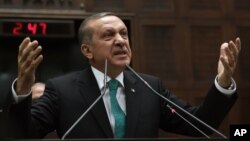ISTANBUL —
Prime Minister Recep Tayyip Erdogan's visit this week to Brussels is being touted as an important step in putting the country's membership bid back on track. But the visit is being overshadowed by a growing political crisis in Turkey. A month-old corruption investigation led by a group of Turkish prosecutors has targeted dozens of Erdogan's allies. The prime minister says the wide-ranging probe - in which dozens of his allies were arrested and more than 20 charged with money laundering, bribery and zoning law infractions-is a foreign-backed "judicial coup."
Erdogan's first visit to European Union's capital in five years was to have signaled fresh momentum in ties after the EU in November agreed to reopen membership negotiations following a three-year freeze.
But, diplomatic columnist Kadri Gursel of the Turkish newspaper Milliyet and Al Monitor website warned Erdogan could face a difficult visit following what many call a purge of the police and judiciary.
"He is going there as a prime minister whose legitimacy is impaired. He is under heavy scrutiny. He is under heavy criticism, because this recent intervention to the justice. There is a strong raising of concerns because of the fact Turkey is losing its character of state of law," said Gursel.
Erdogan is scheduled to meet with leading members of the EU Commission and European Parliament. The EU Commission has voiced concern that the Turkish government's proposed legal reforms threaten the separation of powers, a key membership requirement. But Erdogan dismissed such concerns.
"It's nobody's job to make a statement about Turkey's move over judicial reform," he said. "I'm sorry but I won't buy statements like 'these...we know how to read and write," he said.
Political scientist Cengiz Aktar of the Istanbul Policy Forum said how Erdogan reacted to the expected criticism could determine the country's future relations with the EU.
"Last year’s warming up may end abruptly this Tuesday. The ball is in the prime minister’s field. He will decide whether to back down or whether he will push for it, which would mean a major crisis with the EU because it would mean Turkey is definitely regressing not progressing any more," said Aktar.
With the Turkish public's support for its EU bid at record lows, a showdown with Brussels, observers claim, could play well with his grassroots base. This is an important consideration with key local elections due to be held in March followed by presidential polls later in the summer and national elections the following year.
But diplomatic columnist Gursel warned that the prime minister could pay a high price for any showdown with Brussels.
"If this prime minister resorts to EU bashing as a last option, to please his constituency, this will absolutely destroy what it is left of Turkey’s image and legitimacy. And will [take] its own toll on the economy itself. Turkey needs to be predictable," he said.
The current political instability has already hit the financial markets hard with the Turkish currency hitting record lows. Observers warn a diplomatic crisis with the EU will do little inspire faith of international investors.
Erdogan's first visit to European Union's capital in five years was to have signaled fresh momentum in ties after the EU in November agreed to reopen membership negotiations following a three-year freeze.
But, diplomatic columnist Kadri Gursel of the Turkish newspaper Milliyet and Al Monitor website warned Erdogan could face a difficult visit following what many call a purge of the police and judiciary.
"He is going there as a prime minister whose legitimacy is impaired. He is under heavy scrutiny. He is under heavy criticism, because this recent intervention to the justice. There is a strong raising of concerns because of the fact Turkey is losing its character of state of law," said Gursel.
Erdogan is scheduled to meet with leading members of the EU Commission and European Parliament. The EU Commission has voiced concern that the Turkish government's proposed legal reforms threaten the separation of powers, a key membership requirement. But Erdogan dismissed such concerns.
"It's nobody's job to make a statement about Turkey's move over judicial reform," he said. "I'm sorry but I won't buy statements like 'these...we know how to read and write," he said.
Political scientist Cengiz Aktar of the Istanbul Policy Forum said how Erdogan reacted to the expected criticism could determine the country's future relations with the EU.
"Last year’s warming up may end abruptly this Tuesday. The ball is in the prime minister’s field. He will decide whether to back down or whether he will push for it, which would mean a major crisis with the EU because it would mean Turkey is definitely regressing not progressing any more," said Aktar.
With the Turkish public's support for its EU bid at record lows, a showdown with Brussels, observers claim, could play well with his grassroots base. This is an important consideration with key local elections due to be held in March followed by presidential polls later in the summer and national elections the following year.
But diplomatic columnist Gursel warned that the prime minister could pay a high price for any showdown with Brussels.
"If this prime minister resorts to EU bashing as a last option, to please his constituency, this will absolutely destroy what it is left of Turkey’s image and legitimacy. And will [take] its own toll on the economy itself. Turkey needs to be predictable," he said.
The current political instability has already hit the financial markets hard with the Turkish currency hitting record lows. Observers warn a diplomatic crisis with the EU will do little inspire faith of international investors.




